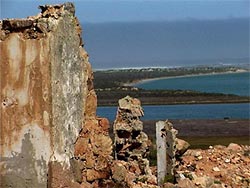
Recently South Africa’s West Coast has experienced an increase in property development that has sparked off hot debate amongst the environmental community. While there is no doubt that a country wide boom in the sale and development of property has played a strong role, the un-spoilt, often empty beaches of the West Coast have offered additional incentive for investment. It is significant that proposed and existing property developments here have predominantly taken the form of holiday homes, resorts and golf courses.
Environmentalists and residents argue that these developments are threatening the tranquility of the region and its sensitive coastal environments. Developments, however, bring with them the promise of local job creation, economic income into the region and alternative forms of livelihoods to local communities.
 Therefore questions arise as to how sustainable these developments are in terms of their environmental, social and economic impacts. Where does one draw the line to say that environmental wellbeing takes precedence over immediate economic and financial gain? How can one make sure that these economic and financial gains do not fall into the hands of a select few? And who ultimately presides over decisions relating to sustainability? Therefore questions arise as to how sustainable these developments are in terms of their environmental, social and economic impacts. Where does one draw the line to say that environmental wellbeing takes precedence over immediate economic and financial gain? How can one make sure that these economic and financial gains do not fall into the hands of a select few? And who ultimately presides over decisions relating to sustainability?
The recent and ongoing discussions that have featured on the DLIST website have highlighted numerous controversial developments that have sprung up along the West Coast of South Africa. Local communities, NGOs and environmental practitioners alike have voiced their concern. Some have even gone as far as to take up the issue with the relevant local authorities. So far there appears to have been no decisive response.
What is clear, is that there are a range of environmental management tools (or processes) that planners, developers and decision makers should utilize before undertaking projects. These tools range from Environmental Impact Assessments (EIAs), to Strategic Environmental Assessments (SEAs), Environmental Management Plans (EMPs) and the use of Integrated Development Planning (IDP).  South African law has numerous policies and acts that can guide decision making and mandates participation of local communities and other interested and affected parties in the planning process. South African law has numerous policies and acts that can guide decision making and mandates participation of local communities and other interested and affected parties in the planning process.
However, according to the users of the DLIST discussion forums (a numer being residents in the most affected areas) the available environmental management and planning tools have often not been considered. Further, local communities are not properly consulted.
The questions arise: Are all parties well informed about the implications of coastal developments - both negative impacts and positive growth? Are all parties aware of the mechanisms available and are all voices being equally heard?
LAWS
1. ACTS
2. POLICY
3. GUIDELINES
4. WHITE PAPERS
5. REGULATIONS
CASE STUDIES
IN THE NEWS
DISCUSSIONS
LIBRARY RESOURCES
CONSTITUTIONS
OTHER WEBLINKS
- Municipal Demarcation Board – South Africa
www.demarcation.org.za
Demographics, maps and profiles of South African Municipalities.
- South Africa's National State of Environment Report
http://www.ngo.grida.no/soesa/
Full report, overview report (English, Afrikaans and Xosa) and city state of the environment reports available.
- Sustainable Coastal Development in South Africa
http://sacoast.uwc.ac.za/education/resources/factsheets/index.htm
Provides key information on initiatives that seek to promote optimal, equitable and sustainable use of South Africa's rich coastal resources.
- Environmental Legal Information in Southern Africa
http://www.iucnrosa.org.zw/elisa/index.html
Environmental legal and policy database in Southern Africa, including Angola, Namibia and South Africa.
- Polity.org.za
http://www.polity.org.za
Policy and law online news for South Africa. Includes legal and policy documents for download.
- Acts Online
http://www.acts.co.za
Up to date South African legislation, including amendments and regulations, in an online format.
- Land Claims Court of South Africa
http://www.server.law.wits.ac.za/lcc/index.php
includes full text and summaries of thejudgmentsof the South African Land Claims Court.
- Legal Resources Centre
http://www.lrc.org.za
Independent, client-based, non-profit public interest law centre for South Africa.
- Southern African Institute for Environmental Assessment
http://www.saiea.com
Publications, news and network of experts on Environmental Assessment in Southern Africa.
- South African Government Information
http://www.info.gov.za/index.html
Legal and policy documents, government leaders and general information about South Africa.
|